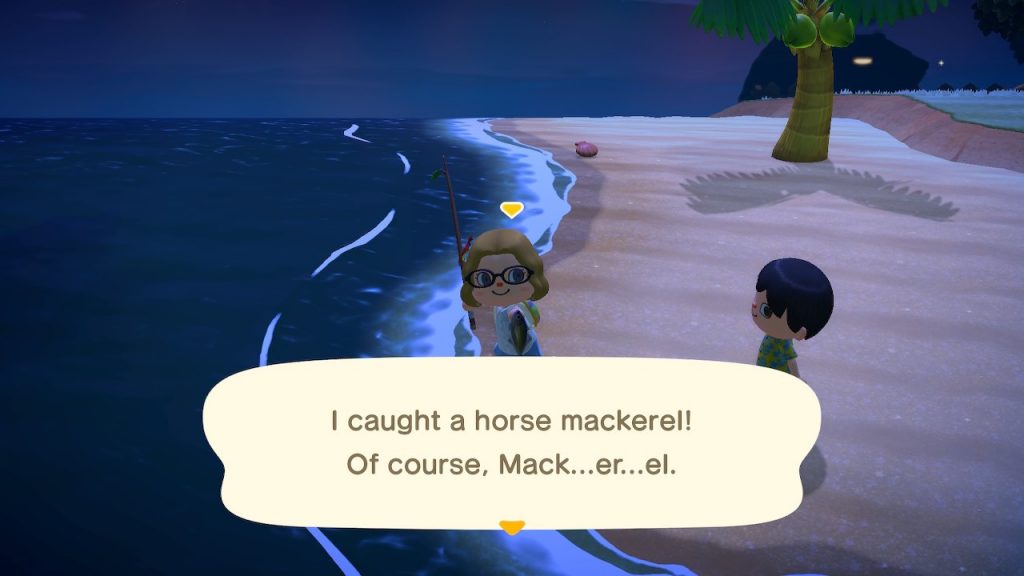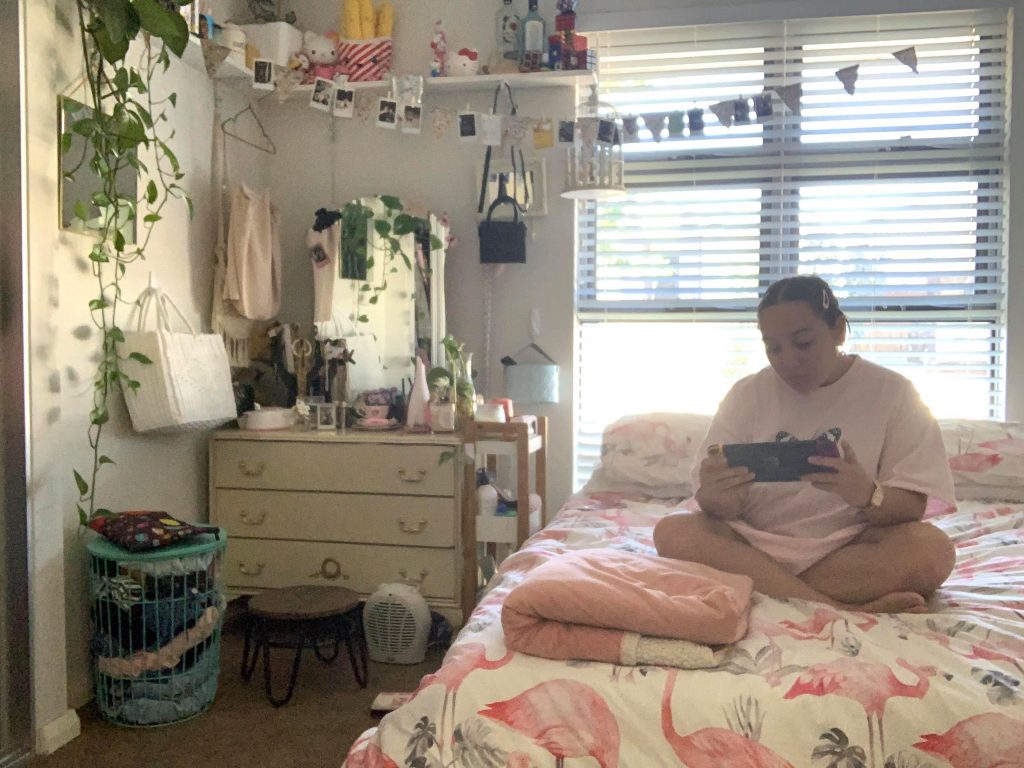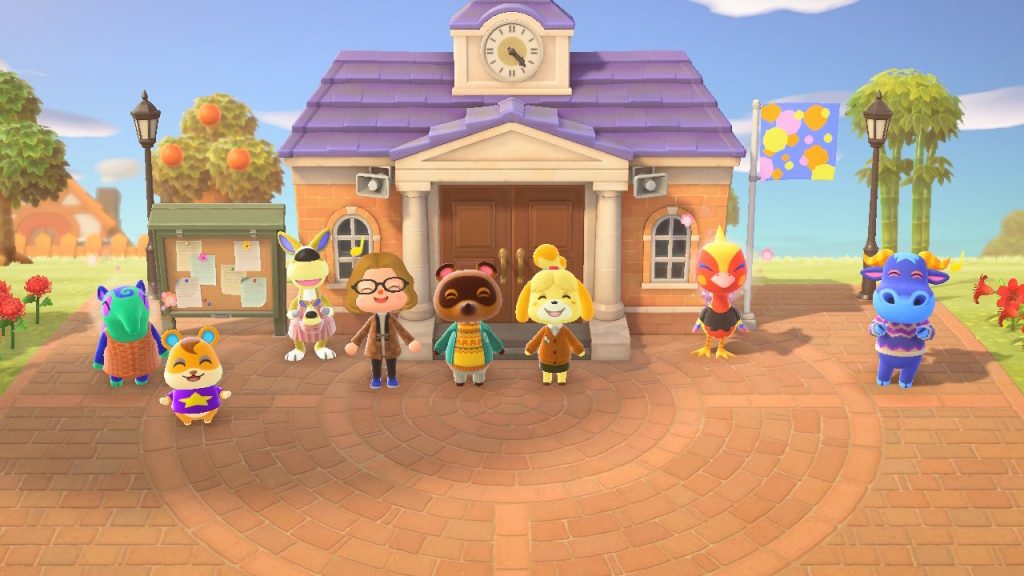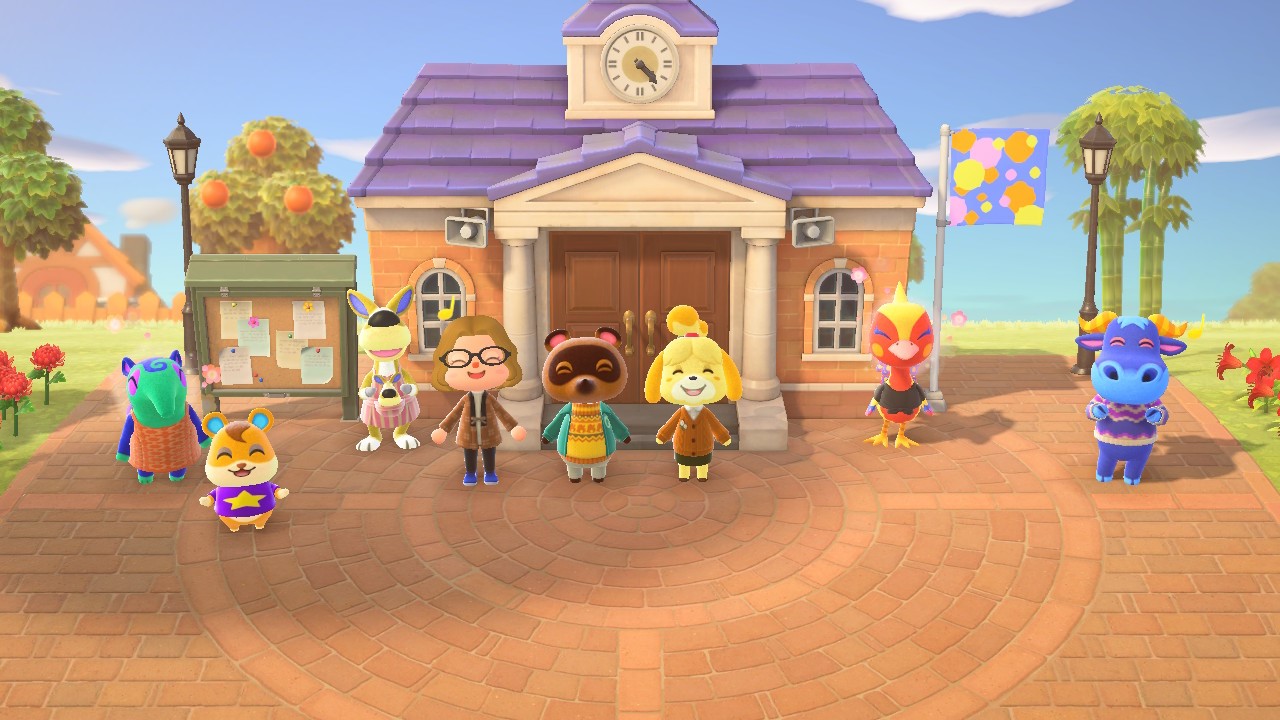Finding the familiar during global uncertainty…
I landed on an uninhabited island, accompanied by a bird and a hamster, guided by a racoon. The grass an unnaturally verdant primary green, peppered with triangles of a lighter shade. Orange trees covered the landscape at random, each yielding 3 perfectly spherical dotted citrus fruits. My steps created a rhythmic crunch as I walked the island. I placed my tent, I stepped inside. My home. My new life.
The Animal Crossing franchise has been a cult-like staple of the Nintendo community for years. The gameplay is simple. You are given a character to play as and arrive on an uninhabited island, which slowly develops as you search for resources, build shops, gather more residents to live with, earn the local currency (bells) and develop your home. There’s no major storyline to speak of and any tasks you are given are optional, with no timeframe or repercussions for doing them incorrectly. Animal Crossing: New Horizons offers all that is sickly sweet in our world without all the boring bits, like responsibility and accountability.

Animal Crossing: New Horizons, opened on March 20 2020 to a staggering reception. Its opening 3 days saw sales of 1.88 million copies in Japan, making it the fastest selling Nintendo Switch game ever. It’s also not the easiest to come by here in Australia – EB Games estimates it can get it to you in under two weeks, but don’t hold your breath.
It would be insensitive to imply that the timing of a global pandemic is ever a good thing, but it’s impossible to address the success of this game without considering the impact of COVID-19. The surge of isolated individuals desperately seeking some escapism, a life so relaxed, lazy and different to their own has a big part to play; a hot commodity in these genuinely unprecedented times.
Political observations made about this game have raised deeper questions of capitalism and the reluctant joys of consumerism. These are generally discussed with jovial affections when referencing Tom Nook – the character who funds the islands operations through Nook Inc., the mega-corp and only taste of reality in the innocent Animal Crossing: New Horizons world.
Am I to understand that some of you people are playing a video game where you’re in debt
— Einstürzende Louboutin (@negaversace) April 15, 2020
In a World of Greedy Landlords, Tom Nook is Actually Pretty Chill https://t.co/BolvsGmSzf pic.twitter.com/QkbseCOrk3
— Laura Kate Dale (@LaurakBuzz) March 25, 2020
Associate Professor of Communications at The College of Saint Rose (Albany, NY USA) Jin Kim, completed an ethnographic study on the gameplay of animal crossing using the 2005 version, Animal Crossing: Wild World. In his piece he observes an exchange of voluntary acceptance and even enthusiasm between players and their receptiveness to the capitalist ideologies presented within the gameplay. His hypotheses based on the notion that all games, to some extent, function ideologically.
“In short, Animal Crossing is about a gamer character’s everyday life.” He explains. “Animal Crossing portrays a life with repetitive and menial tasks. The game repeats everyday life routines including waking up, earning money, shopping, socializing with neighbour animals and going to bed.”
He affirms the connection between real capitalism and virtual capitalism as one of the key arguments in his piece. Players purchase a house with a mortgage attached to it (the joke here is that unlike real life, you’ll get to pay off this debt one day), earning the capital to pay it off in a number of find-and-forage methods such as selling fruit and fossils. Perhaps not quite the convoluted capitalism model we are familiar with today, but the free rein on individualistic money making pursuits still ringing true to the basic principles of the ideology.
“Only steady, patient and persistent works pay off. In that sense, playing Animal Crossing is a self-disciplining process.”

“Animal Crossing is a game with goals that are not enforced.” Kim clarifies. “Most missions are optional, so even if gamers fail to accomplish a specific job, they can continue the game.”
Kim’s final conclusion in his article is perhaps the most profound and insightful of the parallels between the two worlds;
“Animal Crossing is mirroring an irony of the consumer society: you can choose, but you cannot ‘not’ choose.”
Graphic designer Courtney Thane, who was diagnosed with Obsessive Compulsive and Anxiety Disorder 9 years ago said that the game has been a substantial part of her life for the best part of a decade. She emphasised the idiosyncratic value of completing tasks found within the Animal Crossing games for her, a beautiful clarity in her admissions of the reassurance the game’s structure brings.

Photo: Courtney Thane
“I think it’s because there’s something really cathartic and like relaxing about the repetitiveness, which I know some people critiqued but I like, I don’t know if it has to do with having OCD or liking the structure and repetition but I find it really relaxing, ” She explained, the backdrop of her room adorned with Hello Kitty paraphernalia, polaroids and hanging plants. A spritely youthfulness exudes from Thane’s style which is themed heavily with millennial pinks and neutral tones.
There’s some crossover in her thoughts with Kim’s theories on consumerism and choice too, elaborating further on the freedom of individuality Animal Crossing offers. “It makes me feel relaxed and it also makes me feel creative in the way that, I feel like no one’s gonna do it the exact same way if that makes sense?” There’s a lot of hand gestures and pondering as she unravels her thoughts, unsure if what she’s saying can be followed by those not perhaps familiar with her situation.
“If I could take all the ideal things in my life, wake up and choose what to wear, arrange my room nicely…I would just choose to do all those things and that’s what you do in the game.”
A friend had waited outside a Big W store to ensure they were one of the first to purchase Animal Crossing – New Horizons on its release day. He was amongst a group of 5 others. A disgruntled staff member, physically weathered and exhausted from the incessant emotional demands of COVID-19 heaved open the door, exasperatedly huffing to the group,
“If you’re here for toilet paper, we haven’t got any.”
Met with blank faces and a solemn harmonious return of “OK.” from the entourage, the staff member opened the doors. Making a calm but effective beeline for the games section and not stopping once for anything else, they collected their copies of Animal Crossing – New Horizons and left.




